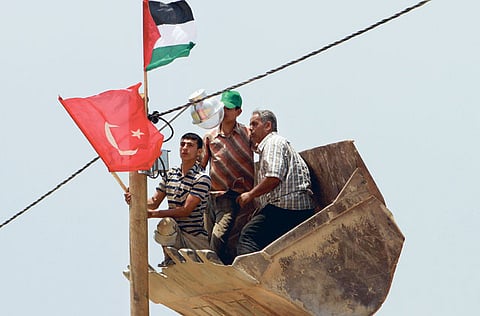Gaza blockade baffles residents
Frozen salmon and facial scrub allowed in but instant coffee is branded a luxury item

Gaza City: Military bureaucrats enforcing Israel's blockade of Gaza allow frozen salmon filet, facial scrub and low-fat yogurt into the Hamas-ruled territory. Cilantro and instant coffee are another matter — they are banned as luxury items.
Over the past three years, Israel has determined down to the tiniest detail what gets into the Gaza Strip and to its population of 1.5 million, using secret guidelines to differentiate between humanitarian necessities and non-essential luxuries in its blockade meant to squeeze the Islamist group Hamas.
The results are often baffling.
"Frozen salmon — we never had it before the blockade," said perplexed salesman Abed Nasser, examining a frozen chunk of fish.
Critics have long maintained Israel's blockade has not just been confusing, but counterproductive.
Israeli Colonel Moshe Levy, a top military official dealing with Gaza, called the aid-laden flotilla to Gaza a "provocation" and said all necessary humanitarian aid already reaches Gaza. Israeli officials say they will stop the flotilla by hauling the ships to an Israeli port if they don't turn back.
Critics say the blockade has failed to dislodge Hamas and has hurt Gaza's poor and blocked reconstruction after Israel's invasion in the winter of 2008-2009. A Palestinian industry report says the blockade has wiped out over 100,000 jobs in Gaza by banning raw materials and stifling trade.
With small exceptions for international aid projects, raw goods vital for trade and construction are banned. A biscuit factory cannot import margarine, and a tomato paste factory cannot bring in empty cans. While fruit, vegetables and frozen meats are let in, fresh meat, vinegar and jam, are not, said Sari Bashi of the Israeli rights group Gisha.
"There are enough quantities of basic food items in Gaza. But because there is a ban on raw materials needed for production and a ban on exporting finished products, people don't have enough money to buy things," she said. "That's why 80 per cent of Gaza residents are dependent on international assistance."
Meanwhile, tunnels built under the Gaza-Egypt border haul in scarce goods at inflated prices, enriching smugglers and Hamas, which taxes the trade. Gaza markets are filled with smuggled products like chocolate sauce and shiny children's shoes that most residents cannot afford.
Hamas officials have used smuggled cement to rebuild the notorious Ansar prison and are currently building a shopping centre.
But Israel is only now shipping in the materials the UN needs to construct 151 apartments for some of Gaza's poorest residents.
"Gaza is being reconstructed —it's just that the UN is not doing any of the reconstruction," said UN spokesman Chris Gunness. He said the UN still had not been given permission to build another 450 apartments in the same project, nor to start rebuilding the 2,400 homes that were destroyed during the war.
Israel has bristled at criticism, insisting there are no shortages of food or other essential goods. On Wednesday, Israel's Government Press Office issued a news release sarcastically encouraging people to visit one of Gaza's few upscale restaurants, the Roots Club, which uses a mixture of smuggled and legally imported goods for its menu.
"We have been told the beef stroganoff and cream of spinach soup are highly recommended," it said.
The press office's director, Daniel Seaman, said he issued the release to counter "propaganda" about a humanitarian crisis in Gaza.
Gaza's tiny elite and foreigners are well served by the handful of restaurants like Roots, where a meal costs more than a typical Gazan's daily wage. But such places are out of reach for virtually all of Gaza's residents, who overwhelmingly rely on UN donated food aid.
Haniya urges world to support aid ships
Esmail Haniya, prime minister of Gaza, has urged the world community to stand up against Israeli actions and support the aid ships heading to Gaza.
"The world community should stand up against Israeli actions because these actions are against all international laws and rules. They are meant to suppress the Palestinian people in Gaza and all those who support the Palestinian people," he told Gulf News.
Haniya and other Gaza officials on Thursday evening visited the old naval port where preparations are being made to host the cargo ships carrying aid for the Gazans.
"The action of the 800 international volunteers displays the conscience of the international community to reject the ongoing injustice meted out to Gazans by the Israeli occupation forces," he said.
During his inspection tour, he also told Gulf News that Turkey has a strategic role in the region. "This convoy by the Turkish non-governmental organisation and other Arabic Islamic and European countries and organisations is the right way to help change the situation in this region for the people to enjoy their rights," he added.
The prime minister also visited the areas where the volunteers will be welcomed and gathered.
- Nasser Najjar/Correspondent



